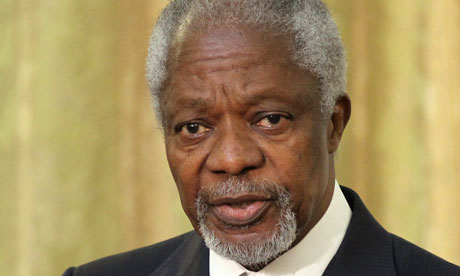Syria promises Kofi Annan it will respect ceasefire
![]()
UN and Arab League envoy optimistic as Thursday truce deadline approaches – but activists report fresh shelling
Ian Black, Sam Jones and agencies

Kofi Annan in Iran: ‘If you want to take [the plan] off the table, what would you replace it with?’ Photograph: Atta Kenare/AFP/Getty Images
Kofi Annan says he has received assurances from Syria that it will respect his planned ceasefire with rebel forces, which is due to begin in under 24 hours’ time.
The UN and Arab League envoy was speaking as activists reported fresh violence in various parts of the country, including shelling of several rebel-held areas in Homs. The British-based Syrian Observatory for Human Rights said “tens of army vehicles” were deploying in the southern town of Maaraba amid intense shooting.
Annan, who is in Iran to enlist Tehran’s help in ending the violence in Syria, said he was cautiously optimistic that the situation could improve as early as Thursday morning, if Damascus stuck to its word and respected the deadline. However, he also warned that “any further militarisation of the conflict would be disastrous”.
The envoy has been pushing Damascus to withdraw its troops from cities and halt all violence by 6am on Thursday morning, to salvage his peace plan.
Speaking to reporters in Tehran, Annan said he and his host agreed on the need to “find a peaceful solution to the crisis”.
“I have received government assurances they will respect the ceasefire,” he said. “If everyone respects it, I think by six in the morning on Thursday we shall see improved conditions on the ground.”
Despite reports from the opposition Syrian National Council (SNC) that 1,000 people have died in the last eight days, Annan has refused to give up on his plan.
“We still have time between now and 12 April to stop the violence,” he said on Tuesday after visiting a refugee camp on the Turkish border.
“It’s a plan we’re all fighting to implement … It’s a plan the Syrians have endorsed, and from the comments made by the opposition, they are also prepared to go along with it if the government meets its commitments to pull the troops out.”
Rebuffing claims that his plan had already failed, he asked: “If you want to take it off the table, what would you replace it with?”
Western governments signalled continuing support for his efforts but used harsh language to condemn Syria’s president, Bashar al-Assad. France called it a “flagrant and unacceptable lie” for Syria to claim it had already withdrawn its forces from populated areas, as required.
William Hague, the foreign secretary, said: “There is no evidence so far that the Assad regime has any intention of adhering to any agreement it makes.” If efforts failed, Hague warned, Britain was ready to return to the UN security council to call again for a united international response “to this clear threat to international peace and security”.
In Moscow, Walid al-Muallim, Syria’s foreign minister, said his country was committed to the plan, and for the first time appeared to imply that Damascus would accept UN monitors, as it accepted Arab League monitors for an ultimately abortive mission last December. Under current plans, an advance UN party is due to deploy by 18 April.
Sergei Lavrov, the Russian foreign minister, appeared to administer a rebuke to Muallim, saying the Syrian government “could have been more decisive” in implementing the plan, but he also called on opposition forces to halt violence.
Syrian opposition activists have scorned Annan as naive for appearing to believe that Assad would act in good faith. But independent commentators insisted he was being realistic. “The object of the exercise is to manoeuvre the Russians into a position where they have to go along with the international consensus,” a former UN aide said.
In the absence of international readiness to intervene in Syria along the lines of Nato’s role in Libya last year, no government is prepared to admit that diplomatic efforts have been exhausted, even if the prospects for success are privately rated as slender to nonexistent.
The Turkish prime minister, Recep Tayyip Erdogan, accused Syrian forces of violating the border in an incident on Monday and said his government was considering its response, including measures “we do not want to think about”.
Ahmet Davutoglu, his foreign minister, spent the day consulting security council colleagues but diplomats made clear that Ankara would not act unilaterally.
The SNC and the Free Syrian Army, the opposition’s principal armed wing, accepted Annan’s plan but rejected a last-minute demand by Assad to provide written guarantees that they would lay down their arms.
Annan told the UN he had been advised by Lavrov after his Moscow meeting with Muallim “that the Syrian government is no longer insisting on written guarantees, but would need me to assure that the other parties and governments also accept the plan”.
Related Articles
Libia y los “guardianes de la libertad”
![]()
¿Ayudó Noam Chomsky a facilitar una invasión imperialista al exculpar a los rebeldes libios y satanizar al régimen de Gadafi?Dan
Libya cracks down on protesters after violent clashes in Benghazi
![]()
Reports of 38 injured in rioting after water cannon and teargas were used against estimated 6,000 people in Libya’s second
Criminal Complaint against Chief of General Staff
![]()
A group of seven intellectuals filed a criminal complaint with the Chief of General Staff on the grounds of a


